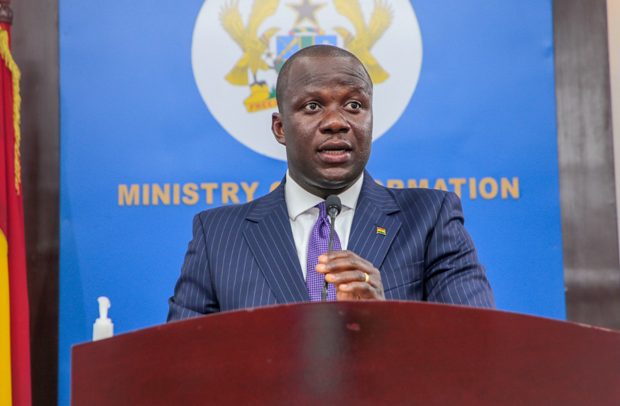Samuel Abu Jinapor
THE MINISTER for Lands and Natural Resources, Samuel Abu Jinapor, has announced that government has secured an amount of US$7 million from the World Bank as loan to support private investment in forest plantation under the Forest Investment Programme (FIP).
He made this announcement at a press conference yesterday in Accra.
According to him, about 85,000 hectares of forest would be planted under the programme.
“Given that we have already lost over eighty per cent of our forest cover since 1900, our second approach to the management of the forest and wildlife resources of our country is through an aggressive afforestation and reforestation programme, to complement the work we are doing to halt deforestation,” he intimated.
The minister continued that, “A total of 547,891.70 hectares of degraded forest lands were cultivated between 2017 and 2021, far in excess of the 157,300 hectares of forest cultivated between 1963 and 2016, under the Ghana Forest Plantation Strategy.”
Green Street Project
Additionally, the minister said government would on Monday, July 25, this year, inaugurate a National Planning Committee to implement the Green Street Project – an initiative aimed at planting trees in the medians and avenues of the regional capitals of the country.
This follows the Green Ghana Project which was launched by government in 2021 and aimed at restoring Ghana’s lost vegetative cover.
The first edition of the Green Ghana Project saw over seven million trees planted on the Green Ghana Day last year whereas this year, preliminary figures indicate that over twenty-five million seedlings were distributed on the Green Ghana Day.
“We will continue to urge all those who planted to nurture the trees to maturity,” the minister disclosed.
Precious Wood Species
As part of efforts to prevent the extinction of some of Ghana’s precious wood species, the Forestry Commission, according to the minister, has developed some 87 hectares of Rosewood Plantation in eight forest districts namely, Tamale, Buipe, Bole, Yendi, Kintampo, Sunyani, Offinso and Nkawie.
The commission, he added, has also developed a five-year strategic plan to develop Ghana’s bamboo and rattan resources.
A bamboo nursery has also been established in the Eastern Region with 200,000 seedlings and a germplasm centre to serve as a research, education and tourist centre.
Forest Plantation Development Fund
The Forest Plantation Development Fund, on its part, is providing financial assistance to some 300 people, made up of 75 graduates and 225 non graduates to develop forest plantations.
The fund has, so far, cultivated some 412.8 hectares of forests in the Ashanti, Bono, Eastern, Oti and Volta regions.
The fund is also supporting the protection of river bodies through the planting of trees along river banks, particularly the Volta Lake and River Dayi.
A total of 7,000 seedlings have been delivered by the fund in support of the protection of Volta Lake and 40 young people have been engaged to plant trees along River Dayi.
Timber Trade
On the economic aspect, the Forestry Commission is promoting timber trade, both domestically and internationally.
This has resulted in a sharp increase in timber trade on the domestic market as well as timber exports.
The commission has facilitated the formation of Forest Industries Association of Ghana, to coordinate forestry activities in the private sector.
BY Nii Adjei Mensahfio & Brady Doran


